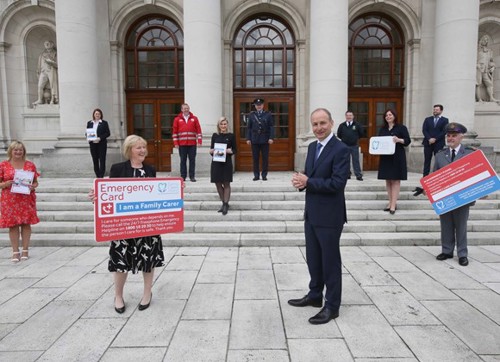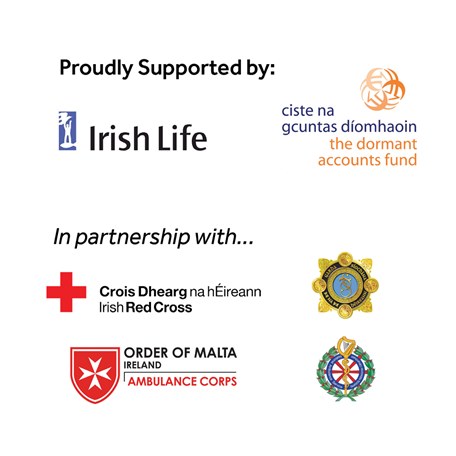Taoiseach Officially Launches Family Carers Ireland Emergency Card Scheme

Pictured with Taoiseach Micheál Martin TD at Government Buildings to launch the initiative is Moira Skelly (centre front left), a family carer who will be the first to sign up to the new scheme; Catherine Cox, Head of Communications and Carer Engagement with Family Carers Ireland; Dr. Kathy McLoughlin, Head of Strategic Partnerships and Innovation, Family Carers Ireland; Gavin Hennessy, Group Diversity and Inclusion Manager, Irish Life; Inspector Jim Clavin, An Garda Síochána; Mark Callanan, Community Engagement Officer, National Ambulance Service, Comdr Brian Power, The Order of Malta; Pauline McDermott, The Irish Red Cross and
Agnes Guste and Jurgita Pakste, Sensory Space.
Today, Monday 31st August, The Taoiseach formally launched Family Carers Ireland’s Emergency Card Scheme. Family Carers Ireland (FCI), in partnership with An Garda Síochána, the National Ambulance Service Community First Responder Schemes, The Irish Red Cross and The Order of Malta has developed a new Emergency Card Scheme for family carers.
When a family carer has an unplanned hospital admission there is a risk that the person who needs their care and support could be left at home alone and uncared for. The Emergency Card Scheme is intended to give peace of mind to family carers as well as ensuring that the person they care for remains safe in such emergencies.
The new scheme can be broken down into 4 simple steps:
Step 1. The Family carer completes the FCI Emergency Care Plan with or for their loved one outlining their care needs, likes, dislikes, medication requirements etc.
Step 2. The Family Carer nominates two people who will step into their caring role in the event of an emergency and provide FCI with these details as part of their Emergency Care Plan
Step 3. The completed Emergency Care Plan is sent to FCI and the family carer receives their Emergency Card which they carry at all times. The card includes a Freephone emergency helpline number.
Step 4. In the event of an emergency, and where a person’s named emergency contacts are unavailable, Family Carers Ireland will determine the person’s needs and either mobilise:
A red response (for a person who needs a high level of support), where a member of An Garda Síochána will visit the person and decide if the person requires transportation to the emergency department as a place of safety; or
A green response which will include contacting a pair of volunteers from either the National Ambulance Service Community First Responder Schemes, The Irish Red Cross or The Order of Malta to sit with, and to support the person until a home care package can be organised. During this emergency period FCI may also provide up to 72 hours of in-home emergency support where appropriate.
In a 2019 survey, 74 per cent of family carers feared for their loved-one’s future and in particular worried about who will provide care for their loved one should they, the family carer, become ill or have an accident. FCI’s ‘Caring Through Covid’ survey also revealed that 84 per cent of family carers surveyed worry about getting the coronavirus and not being able to look after the person(s) they care for.
Speaking about the initiative Catherine Cox, Head of Communications and Carer Engagement, Family Carers Ireland said:
“The pandemic has really highlighted the need for this scheme. Family carers often worry about what will happen to the person they care for, in the event that they, the family carer, are involved in an accident or emergency. This has never been more important than in our current times. We are extremely grateful to Irish Life and Dormant Accounts for funding this new initiative and offering this reassurance to Ireland’s family carers.”
Speaking at the launch Kathy McLoughlin, Head of Innovation and Strategic Partnerships with FCI thanked all the key partners who have engaged and worked with FCI to make this scheme a reality, as without their support it would not have happened.
“We were delighted to welcome the Taoiseach, Micheál Martin to officially launch the Emergency Card Scheme and to witness family carer Moira Skelly become the first person to sign-up for the scheme” stated Dr. McLoughlin.
Moira Skelly and her husband Paul have four children. The youngest Ciara, now aged 25, was born with special needs. She has epilepsy, cerebral palsy, autism, global developmental delay, and requires 24-hour care. She receives her daily nutrition through a PEG-tube and has a permanent catheter.
Moira commented,
“This card and scheme addresses one of our greatest fears as a family – we constantly worry about what will happen to Ciara if anything happened to me or Paul – this gives us great peace of mind knowing that there is a plan in place particularly for those first crucial hours should such an emergency take place. We want to commend Family Carers Ireland on really “listening” to family carers and addressing one of our greatest concerns through this new scheme”.
There are over 355,000 family carers in Ireland. Family carers make extraordinary sacrifices and work extremely hard, sometimes 24 hours a day, to provide care for children and adults with intellectual or physical disability, frail older people, people with palliative care needs or those living with mental health, chronic illness or addiction issues. Their unpaid work saves the State a staggering €10bn each year.
The Emergency Card Scheme has been funded by Irish Life and with the support of Dormant Account fund administered by Pobal. A social story (accessible storyboard) to explain the scheme has also been developed with the support of Sensory Space.


